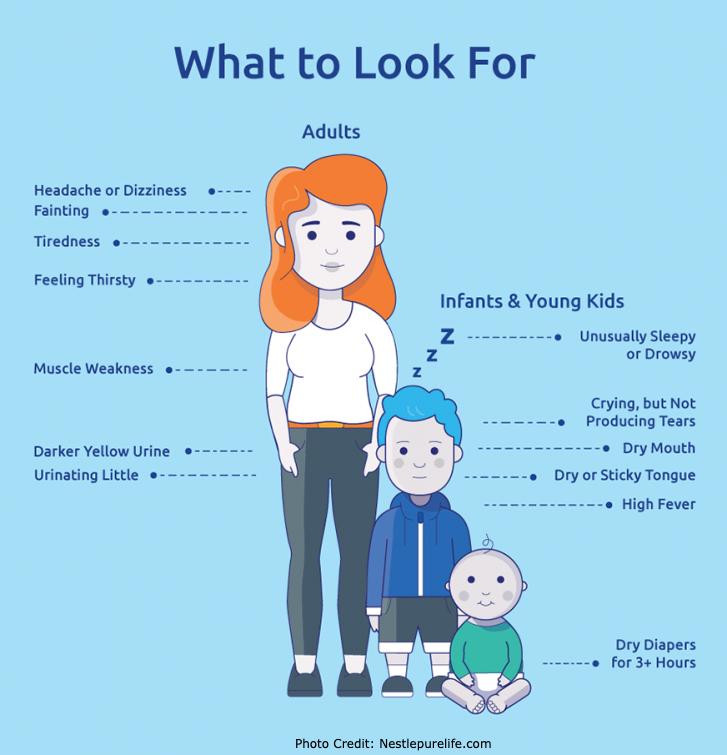Nice weather is here, and that calls for a lot of outdoor activities and many hours spent running under the blazing sun. With fun, we can easily forget to hydrate our bodies.
Remember that the human body is made of about 60% of water for men and 55% for women. Without water, we would not be able to survive. Dehydration occurs when there is more water leaving our body than entering it due to inadequate water intake.
Water in our body is continually being lost throughout the day as we breathe, sweat, urinate, and defecate. Thus, most occurrences of dehydration are reversible by hydrating the body with fluids.
What are the signs and symptoms of dehydration?
Thirst is not always the best indicator for dehydration. For example, older adults don't regularly feel thirsty as compared to younger adults. So, how do you know if you or your child is dehydrated? Here are the signs and symptoms to look for:
What can cause dehydration?
Diarrhea
Vomiting
Sweating too much
Fever
Not drinking enough
Frequent urination
Medications
What are the risk factors for dehydration?
Anyone can be at risk of dehydration. However, certain people are at greater risk:
Infants and young children
Their bodies are more sensitive to a small fluid loss. Also, they have a larger surface area to volume area, which makes them lose a higher proportion of body fluids from a fever faster than adults.
Older adults
As we age, the body’s ability to conserve fluids decreases. Older adults are less likely to be aware of the signs of dehydration and tend to forget to hydrate the body.
Athletic people
The risks for dehydration and heat stroke increase when it’s hot and humid. Humid air makes it harder for sweat to evaporate and for the body to cool down quickly. As a result, the body's temperature increases, resulting in a greater need for fluid replenishment.
People with chronic illnesses
Having chronic conditions such as diabetes, kidney disease, and cystic fibrosis increase the risk of dehydration. Also, certain medications that these patients are on can increase sweating and urination.
What are the complications of dehydration?
If dehydration is not detected or treated early, serious complications can occur:
Seizures
Not having enough fluids in the body can cause an imbalance in the body’s electrolytes such as potassium and sodium, which are crucial in cellular electrical signaling. Electrolytes imbalance can lead to involuntary muscle contraction, irregular heartbeat, confusion, and blood pressure changes.
Kidney problems
Prolong dehydration can lead to the development of kidney stones, urinary tract infections, and kidney failure.
Heat injury
Prolong exposure to high temperature and humidity without adequate hydration can lead to heat exhaustion and heat stroke.
How can I prevent dehydration?
Staying hydrated is the key to preventing dehydration. Consume plenty of fluids and food that is high in water content such as watermelon on an everyday basis, especially when you are sick. Prepare for strenuous activities that are outdoor to prevent excess fluid loss.
Wear breathable clothing and shoe
Have a hat for shielding the sun
Avoid drinks that have caffeine and are high in sugar and salt
Always carry a water bottle when the weather is hot and when exercising
How can I treat dehydration?
Increase fluid intake with water, clear broth soups, ice popsicles, fruit drinks, or sports drinks (e.g., Gatorade).
Treat the underlying conditions that caused the dehydration such as vomiting, diarrhea, or fever with OTC medications such as Bonine (antiemetics), Imodium (anti-diarrheal), and Tylenol/Advil (anti-pyretic).
Oral rehydration can be used in both adults and children to re-establish the electrolytes imbalance in the body due to vomiting and diarrhea. Talk to your healthcare provider or pharmacist a
Seek immediate medical help when you are lethargic, confused, have prolonged dizziness, unable to pass urine for 8 hours, or have a low level of consciousness.
So remember, don’t neglect your body’s thirst for water!
References:
“Dehydration.” MedlinePlus, U.S. National Library of Medicine, 29 May 2019, medlineplus.gov/dehydration.html.

